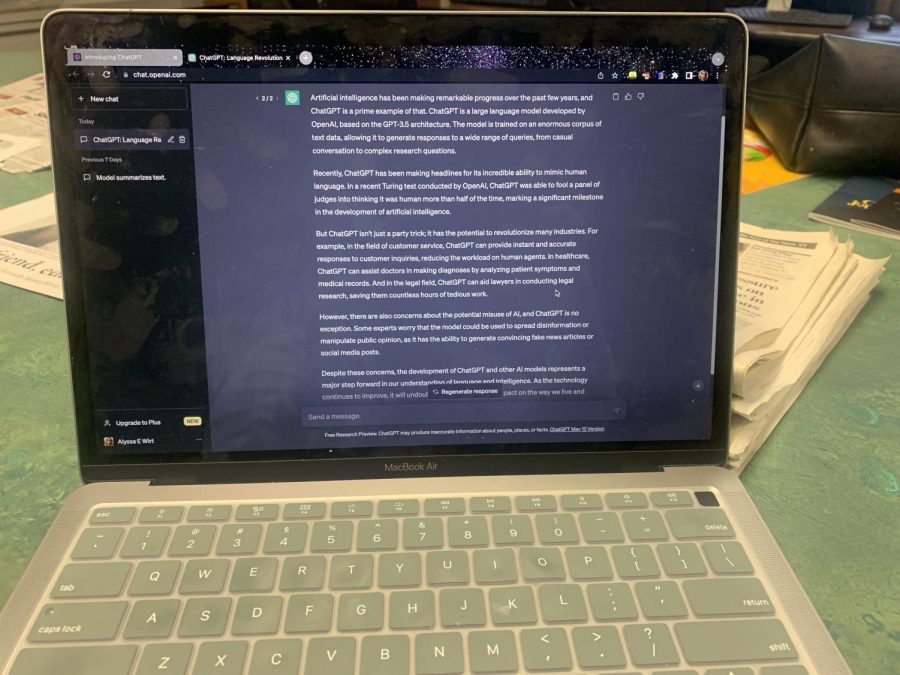ChatGPT: Helpful or harmful?
Is the rise of AI the way to go for education in the future, or will it drag us down?
With the rise of Artificial Intelligence and technology in daily life and education, there is a growing concern about students using that AI to plagiarize.
Over the past few weeks, conversations about AI – specifically ChatGPT – have risen within the CCC community. Some feel that it is a helpful tool, and others think that it’s a cause for concern due to the rise in students using ChatGPT to do their assignments for them.
But what is ChatGPT? ChatGPT is an AI chatbot made by OpenAI and was released in November of 2022. According to OpenAI, ChatGPT’s uses range from providing suggestions on protecting yourself from a burglary, checking code for errors, and writing notes to introduce yourself to neighbors. Provide a research-oriented command in the chat box, and ChatGPT will do it.
If ChatGPT is so useful, it has to cost money to use or be bought then, right? No, ChatGPT works from an internet browser with a free account and phone number verification – no purchase is necessary.
Because ChatGPT is so easily accessible, some faculty at Contra Costa College have expressed concern that there is a high risk of students using the application to plagiarize their work.
Brandon Marshall, an English professor at CCC, mentioned that he’s had students turn in work made by ChatGPT.
“Last semester, I got a nonsensical essay to a prompt we were writing on a book in my class. And I thought it was a joke,” said Marshall. “It had nothing to do with the book, but it was written like, ‘I’m an expert on this book.’ It had nothing whatsoever to do with it.”
Marshall turned to ChatGPT to test his assignment.
“We ran over to ChatGPT, to the open AI source, just put my prompt in there, and it spat out an essay, almost exactly like the one that I had gotten.”
Angela Villafañe, a La Raza Studies professor at CCC expressed concern outside of just students using ChatGPT for assignments.
“It’s a bit detached and it removes you somehow, from others,” Villafañe remarked regarding students turning to ChatGPT rather than their professors for help. “I feel like we’re losing that connection. I know it can be used for good things, but I think it has to be best surveilled.”
While using Chat GPT falls under the criteria for plagiarism, Marshall doesn’t believe that the students that use it are malicious.
“Students who cheat, cheat because they’re lost, not because they’re like, ‘Oh, I’m lazy, I don’t want to do anything,’” Marshal said. “You know, I think for the most part, if they’re in college, they’re here because they have goals, and they’re usually pretty driven.”
So if ChatGPT is not a helpful resource, why do students use it?
“I found it on Tik Tok. I think it was during a time before midterms happened,” said one student who spoke on the condition of anonymity. “I started using it because I was having trouble with trying to come up with ideas or just an outline for my essays. It gave me more ideas of how I should outline my essay and think about what I should be talking about in each paragraph.”
The student said that in particularly stressful school situations – such as when they are facing many deadlines – ChatGPT has been a helpful resource for finding answers to simple homework questions, or the like.
There does not seem to be a clear course of action for schools to take when it comes to battling the risks of plagiarism from ChatGPT. Many educators are grappling with whether to view ChatGPT as a resource to be harnessed or a threat to learning.
Programs that the college uses to detect plagiarism, like TurnItIn, have been updated to detect ChatGPT and other AI-assisted writing
“Syllabi will always have plagiarism statements, academic honesty statements, I think that’s probably something that faculty will want to do just update it to include Chat GPT so students know that this, this too, is plagiarism,” said Contra Costa College Senior Dean of Instruction, Jason Berner. “And it can have academic consequences, in terms of ensuring that they don’t use it in a harmful way.”
Right now, ChatGPT is far too new for there to be concrete solutions for how to prevent plagiarism. Its impact is yet to be fully realized.
“I choose to find it interesting rather than threatening at this point,” Berner explained. “I think that you know, again, every new technology will pose challenges.”


